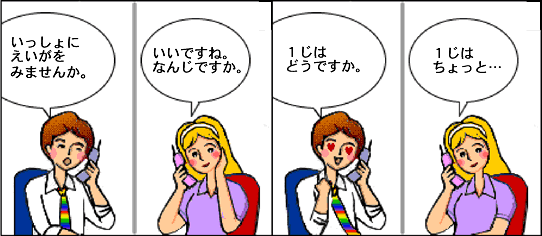| In this lesson, we will learn how to extend an invitation: "Won't you/Would you like to V?" We will also learn how to accept or decline it. | |
 |
You can invite someone to do something by using the nonpast, negative form of verbs plus か. For example, you change たべます below into the nonpast, negative form, たべません. Even though たべません means "not eat," when it is followed by the question marker か, the whole sentence means much like the English expression, "Would you like to eat lunch?" In Japanese, this is said as ひるごはんを たべませんか (Lit. "Won't you eat lunch?").
|
Let's examine other examples! How do you change the following two sentences into an invitation? All you have to do is to replace the ending of a verb ます with ませんか. The phrase いっしょに below means "together."
|
|||||||||||||||||||||||||
So, the following two sentences express an invitation in Japanese. Click on the audio icons to hear how they are pronounced.
|
|||||||||||||||||||||
When you accept an invitation, you say: ええ、いいですね。
|
|||||||||||
When you decide to decline an invitation, you can be polite by using one of the following expressions. ちょっと (lit., "a little bit"), or すみませんが、ちょっと… (lit., "I'm sorry, but a little bit.") To an English speaker, "a little bit" or "I'm sorry, but a little bit" does not make sense as an answer to an invitation. In Japan, however, it is considered clumsy and impolite to say "no" or いいえ directly. Saying ちょっと… with a hesitation is a more socially appropriate way to decline an invitation.
|
|||||||||||||||
In the invitation, らいしゅうの きんようび、アトランタで えいがを みませんか, there are three elements: Time ("next Friday"), Place ("in Atlanta"), and Activity ("watching a movie"). EVen though you would like to accept the invitation, one or two things in the invitation might not work for you. Let's see how you can indicate your hesitation to accept the invitation wholeheartedly.
|
||||
If "next Friday" is the problem, you can name the problem, らいしゅうの きんようび, mark it with the topic marker は, then say ちょっと as in らいしゅうの きんようびは ちょっと.
Often, ちょっと is used as a prelude to negotiate the details of a proposal. |
|||||
If the location is the problem, you can name the problem, アトランタ, mark it with the topic marker particle は, then say ちょっと as in アトランタは ちょっと.
Now, if watching a movie is the problem, what do you say? |
|||||
If the activity is the problem, you can name the problem, えいが, mark it with the topic marker は, then say ちょっと as in えいがは ちょっと.
You will see how to develop a conversation from here when we study model dialogues in the next section. |
|||||
